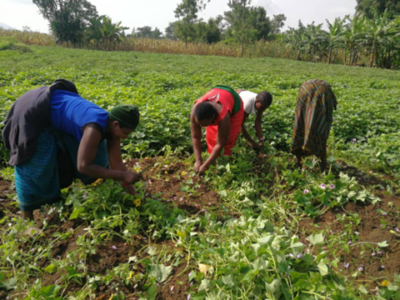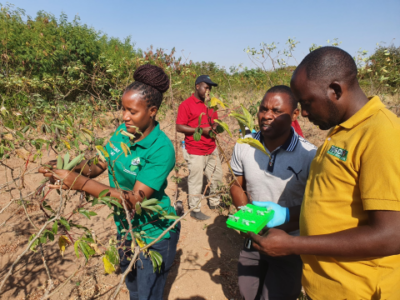
When crisis strikes, meeting the basic needs of affected people becomes a major challenge. Drought, flooding, storms, famine, political instability, war, and other disasters usually disrupt, in different ways, access to food, water, and shelter. Root, Tuber, and Banana crops (RTBs) play pivotal roles in these stressful situations. RTBs have many advantages, including ease of cultivation, low labor requirements, high energy content, and broad dietary acceptability among many populations, especially in the tropics and subtropics. For these reasons, the seed systems of RTBs are an important focus in disaster response and recovery.
A virtual event organized to that effect by the International Potato Centre and partners on 23 and 25 May attracted a record number of over 170 participants from 19 African, Asian, and American countries. The event sought to extend the CGIAR’s RTB Toolbox to humanitarian partners as a set of evolving resources to understand seed systems, and to improve interventions.
Participants representing government, NGO, farmer associations, development aid, disaster response, and private sector organizations shared and developed an understanding of different humanitarian intervention contexts, as well as their meaning for RTB seed production, quality, and dissemination through stakeholders in DRC, Cameroon, Ethiopia, Bangladesh, Haiti, and other countries.
The workshop featured expert speakers and facilitators from partner organizations, including the Seed Equal Initiative of One CGIAR, CIP, the Alliance of Bioversity International and CIAT, Mercy Corps, and USAID’s Bureau of Humanitarian Assistance.
“To our greatest surprise and excitement, the high number of registered participants signals the huge need for national extension officers, humanitarian actors, and local communities to improve their knowledge on the current role and contribution of RTB crops in local farming systems and re-building better, sustainable livelihoods, as well as resilience towards climate change,” said Margaret McEwan, Senior Scientist at International Potato Center and co-organizer of the workshop.
Participants also seized the opportunity of the virtual training to reflect on the challenges they face in their various contexts.

“Most humanitarian organizations just distribute planting material. They don’t provide substantial support package including capacity building and related technology promotion”, lamented Wakene Hambisa, CIP Research Associate who considered the training as part of the capacity building exercise.
“Quality assurance is challenging to obtain even from trusted sources, whether the seeds are certified or not,” added Joanne Cagin, Concern Worldwide Food Security and Livelihoods Advisor.
“It is critical to understand how existing seed systems function and their contribution to resilience and maintaining biodiversity. We need to use this understanding to improve availability, access, and affordability of quality seed for vulnerable populations”, said Chris Ojiewo, Seed Equal Initiative Lead and keynote speaker at the virtual event.
Jorge Andrade-Piedra, Senior Scientist and co-organizer of the event believes the training will shed light on how to tackle seed insecurity as it “manifests as reduced availability of seed, difficulty in sourcing or accessing seed when it is required, and poor phytosanitary or physical quality of seed”.
“Hence the need to join hands across the RTB and humanitarian communities to improve the quantity and quality of RTB seeds available for smallholder farmers in complex crises,” he added.

Such efforts will require a multi-sectoral approach through private-public partnerships.
“I thank the presenters and really like the point about improving coordination among seed system actors in humanitarian contexts, especially the public-private partnerships. What is the plan for countries where public engagement around the seed system sector is limited? USAID and other donors, NGOs, and CGIAR institutions can’t do it alone, but government actors commitment and partnership with the private sector will create sustained change.” said Cara Raboanarielina, a Strategic Learning Lead at Catholic Relief Services from Madagascar.
The workshop comes after one-year intensive efforts to understand the capacity needs of humanitarian partners in strengthening their root, tuber, and banana interventions in Cameroon, the Democratic Republic of Congo (DRC), Ethiopia, Madagascar, Mozambique, Haiti, and Bangladesh.
The virtual training is one in a series of physical and online events to be delivered as part of the “Tools4SeedSystems: working towards resilience through root, tuber and banana crops in humanitarian settings” initiative, a project based on the Toolbox for working with root, tuber, and banana seed systems and funded by USAID Bureau for Humanitarian Affairs.
